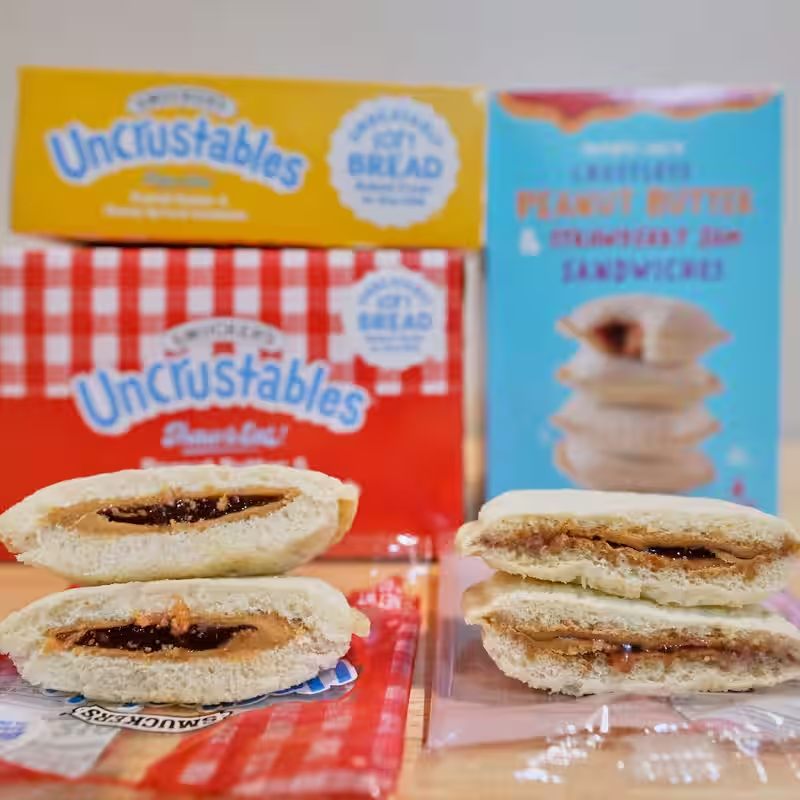Uncrustables Lawsuit: Can a Sandwich Shape Be Trademarked?
In a move that’s stirring up school lunchboxes and legal circles alike, J.M. Smucker Co. has filed a federal lawsuit against Trader Joe’s, accusing the popular grocery chain of selling a near-identical version of its iconic Uncrustables—right down to the crimped edges.
The lawsuit, filed in the U.S. District Court for the Northern District of Ohio, claims Trader Joe’s new Crustless Peanut Butter & Strawberry Jam Sandwiches are an “obvious copycat” that infringe on multiple Smucker’s trademarks—including one for the product’s signature “round pie-like shape with distinct peripheral undulated crimping.”
What Exactly Are Uncrustables?
For the uninitiated: Uncrustables are frozen, pre-made peanut butter and jelly sandwiches with the crusts removed, sealed in a soft, circular pocket of white bread. First launched in the mid-1990s, they’ve become a cultural phenomenon—eaten by NFL players, wildfire firefighters, and millions of schoolkids across America.
Smucker’s says it has invested over $1 billion in developing, marketing, and protecting the Uncrustables brand. The company argues that Trader Joe’s isn’t just selling a similar product—it’s deliberately mimicking its look, feel, and packaging to “trade off Smucker’s valuable goodwill.”
The Crimp That Started a Legal War
At the heart of the dispute is something most consumers wouldn’t think twice about: the crimped edge. Smucker’s holds a registered trademark not for the recipe (which can’t be copyrighted), but for the distinctive shape and sealing method that gives Uncrustables their recognizable puck-like appearance.
According to the complaint, Trader Joe’s version uses an “almost identical” crimp pattern, round form, and even similar jelly-to-peanut-butter ratio—creating what Smucker’s calls “consumer confusion.”
Can You Trademark a Sandwich?
Technically, no—you can’t trademark a food recipe. But you can trademark a product’s unique visual design if it serves as a “source identifier.” Think Coca-Cola’s bottle shape or the golden arches of McDonald’s.
Legal experts say Smucker’s case hinges on whether courts agree that the crimped edge is distinctive enough to signal “Uncrustables” to consumers—not just a functional seal.
“This isn’t about peanut butter and jelly,” said IP attorney Lena Torres. “It’s about whether a food item’s physical design can function like a logo.”
Trader Joe’s Stays Silent—For Now
As of October 16, 2025, Trader Joe’s has not issued a public response to the lawsuit, nor has it commented on whether it will pull the product from shelves. The chain is known for its private-label products that often mimic national brands at lower prices—like its “Joe’s O’s” (a Cheerios lookalike) or “Two Buck Chuck” wine.
But this time, Smucker’s is drawing a hard line.
Why This Matters Beyond the Lunchbox
This case could set a precedent for how food companies protect their products in an era of aggressive private-label competition. With grocery chains like Trader Joe’s, Costco, and Aldi expanding their in-house brands, big food manufacturers are increasingly turning to intellectual property law to defend market share.
Smucker’s isn’t just protecting a snack—it’s defending a $500 million+ annual revenue stream. Uncrustables sales have surged in recent years, fueled by nostalgia, convenience, and viral TikTok trends.
What Happens Next?
The court will now decide whether Trader Joe’s must halt sales, repackage its product, or pay damages. Legal analysts expect a settlement before trial—but the message is clear: don’t mess with the crimp.
Sources
The New York Times: “Smucker’s Sues Trader Joe’s Over ‘Copycat’ Uncrustables”




